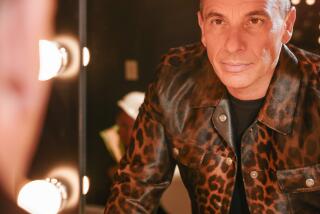MURPHY MOVES BEYOND ULTRA-HIP SCREEN IMAGE
- Share via
Even before a capacity crowd of nearly 19,000 fans took their seats for Eddie Murphy’s appearance at the Pacific Amphitheatre in Costa Mesa on Friday, it became obvious that they were soon to be in the presence of a Really Big Star.
Merchandising booths in the concourse outside the amphitheater displayed Eddie Murphy buttons, T-shirts, sweat shirts and large autographed posters, while the souvenir program included shots of Murphy with numerous members of the rich and famous.
If people still weren’t convinced of his celebrity status, the performance opened with nearly 10 minutes of video clips, projected on three large screens, from Murphy’s days with “Saturday Night Live,” other TV appearances and his hit films.
Had the many egotistical production touches gone without further comment, even Murphy’s larger-than-life persona would have had trouble overcoming the feeling that his show had become an exercise in self-congratulations. Instead, he continues to use his stand-up act to wrestle with the phenomenal fame he’s achieved at 25 and which grows even greater with each subsequent project.
Murphy also appears to be broadening his audience beyond the predominantly young, white crowd he attracted in the past, if the Pacific’s heterogenous mix of ages and races is a good audience barometer.
As soon as the 90-minute performance began, Murphy launched a barrage of expletives that made it clear he’s still not secure enough in his comic abilities to abandon his penchant for four-letter words, which in 1986 is more irritating than shocking or enlightening. It seemed at times that minus all the expletives, for which the crowd roared approval, the show would be half as long.
Murphy did, however, take the next step toward reducing his dependence on the cheap scatological jokes by using them in a self-reflective routine on his cursing that also incorporated his deadly accurate impressions of Bill Cosby and Richard Pryor.
Such language can be used effectively, if sparingly, as he proved in a routine about a couple of 5-year-olds, one of whom disastrously lets the dreaded four-letter word slip while on a trip to the supermarket with his mother.
Later, Murphy developed a short bit on his foray into the world of pop music when some fans began clamoring for him to sing his 1985 hit “Party All the Time,” which--not coincidentally--was played before and after the show. Claiming that singers have an easier task than comedians “because they get you people to sing along and do it for them,” he proceeded to prove it with a routine about audience participation at rock concerts.
A routine about his parents repeated from last year’s Universal Amphitheatre shows still hasn’t found an adequate payoff punch, and it remains a character study with no real insights.
But in discussing men’s and women’s sexual attitudes, Murphy portrayed relationships that place self-gratification above mutual satisfaction, a theme he expanded upon in perhaps the show’s best segment on his notions of love, marriage and community property laws. (“It’s not the money that bothers me. It’s ‘half.’ If you had $5 and she got $2.50, you’d be screaming, ‘It ain’t fair.’ ”)
The “half” punch line provided a setup that was successfully exploited several times, but not, inexplicably, in his final routine about love and fidelity, where it could have brought the segment--and the show--to a more satisfying conclusion.
If a few unsuccessful routines left him short of the comic victory he seeks, the show nevertheless indicated that Murphy is still attempting to stretch beyond the safe confines of his one-dimensional, ultra-hip screen persona.
More to Read
The biggest entertainment stories
Get our big stories about Hollywood, film, television, music, arts, culture and more right in your inbox as soon as they publish.
You may occasionally receive promotional content from the Los Angeles Times.










